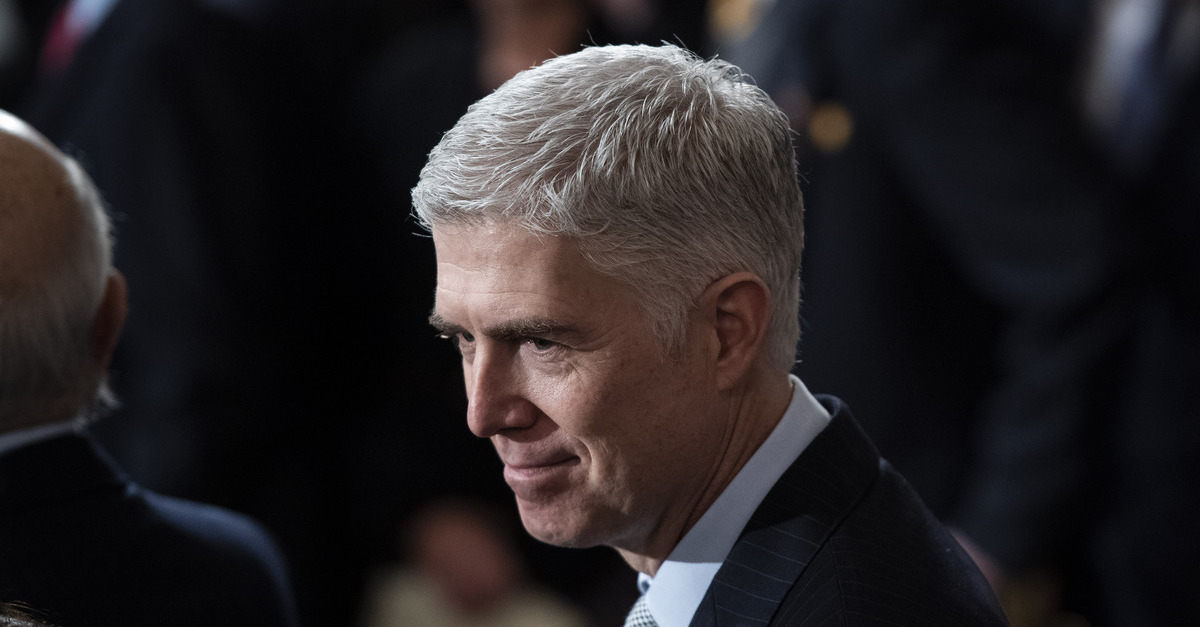
U.S. Supreme Court Justices Samuel Alito and Neil Gorsuch, in two separate dissents on Thursday, expressed concern about the way the federal court system and the high court itself have treated restrictions on religious institutions during the pandemic.
The underlying case concerns COVID-19 restrictions issued in late November by Kentucky Governor Andy Beshear (D) which closes all K-12 schools for in-person instruction until December 18–when all schools in the Blue Grass State go on winter holiday break.
Timing looms large here.
In the would-be case stylized as Danville Christian Academy v. Beshear, a majority of justices found that the governor’s order “effectively expires this week or shortly thereafter, and there is no indication that it will be renewed,” according to the court’s unsigned decision. Procedurally, the court declined to vacate an appellate court’s stay of a district court’s injunction–leaving the executive order intact for the final day of its natural life.
“Under all of the circumstances, especially the timing and the impending expiration of the order, we deny the application without prejudice to the applicants or other parties seeking a new preliminary injunction if the governor issues a school-closing order that applies in the new year,” the court noted in its brief dispensation of the case.
Justice Gorsuch, however, doing most of the heavy lifting for the tandem, took umbrage and issue with that approach.
To hear the textualist justice tell it, the governor’s order was likely an impermissible attack on the First Amendment’s Free Exercise Clause. But, Gorsuch stressed, he was just asking questions about how the court interprets its own precedent in Free Exercise cases.
Key for the dissents is that there is also another extant executive order that, in Gorsuch’s words, “permitted virtually all other in-person activities to continue with only capacity restrictions.”
“Whatever the ultimate merits of this case, the Sixth Circuit’s decisional path was flawed in at least two respects,” Gorsuch argued. “First, the court had an obligation to address the plaintiffs’ argument that the two [orders], considered together, resulted in unconstitutional discrimination against religion. Whether discrimination is spread across two orders or embodied in one makes no difference; the Constitution cannot be evaded merely by multiplying the decrees.”
The dissents also raised a second potential issue regarding the application of longstanding Supreme Court precedent contained in the landmark Free Exercise case of Employment Division, Department of Human Resources of Oregon v. Smith.
The majority noted, however, that the petitioner religious school in Kentucky didn’t actually raise that second claim with any of the three courts so far–which goes a substantial way toward explaining why that argument didn’t gain much traction.
But Gorsuch spent some time titling at the argument anyway:
Perhaps the Sixth Circuit’s errors are understandable. Smith’s rules about how to determine when laws are “neutral” and “generally applicable” have long proved perplexing. It is far from clear, too, why the First Amendment’s right to free exercise should be treated less favorably than other rights, or ought to depend on the presence of another right before strict scrutiny applies.
The often unpredictable heir to Antonin Scalia’s throne went on to blast his colleagues for denying relief based on equitable considerations.
“Whatever the problems with the Sixth Circuit’s order, [the majority] says, we should let this one go because this case is old news; winter break is coming soon, and the Governor’s decrees will expire in a few weeks, on January 4,” Gorsuch opined. “I would assess the equities differently.”
The dissent goes on:
The [orders] remain in force, the dispute over them remains live, and the decision allowing them to stand is flawed. Nothing prevents us from saying so; no one attempts to suggest this case is moot; and the applicants are entitled to a fair assessment of their rights under accurate legal rules. The plaintiffs proceeded expeditiously in challenging the [orders]; they have hardly sat on their rights. Nor should a governor be able to evade judicial review by issuing short-term edicts and then urging us to overlook their problems only because one edict is about to expire while the next has yet to arrive. Come January 4, a new school semester will be about to start, and the governor has expressly told us that he reserves the right to issue more decrees like these if and when religious schools try to resume holding classes. Rather than telling the parties to renew their fight in a month, asking the Sixth Circuit to resolve the case now, under accurate legal rules, would be better for everyone.
Alito, for his part, spend his much shorter (three-paragraph) dissent saying that he agrees with Gorsuch, offering an olive branch to his colleagues’ “reluctance” and advising the parochial school on legal strategy should Beshear issue neutrally-applicable public health restrictions again.
[image via Jabin Botsford – Pool/Getty Images]